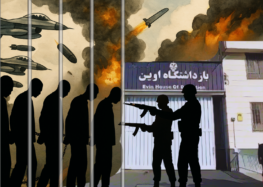Executions Of Two Prisoners At Evin Prison

Ali Saremi
A few hours ago, the Islamic Republic News Agency announced executions of two prisoners, Ali Saremi, an alleged member of the Mojahedin-e Khalgh Organization (MEK), and Ali Akbar Siadat, referred to as “an operative of an espionage service,” on Tuesday morning. Their charge was moharebeh, enmity with God.
The two executions came only 48 hours after the execution of Kurdish activist Habibollah Latifi, who was scheduled to be hung on Sunday morning inside Kurdistan Province’s Sanandaj Prison, was halted. There is growing concern that other individuals who have received execution sentences may be facing the same fate.
During an earlier interview with the International Campaign for Human Rights in Iran, Ali Saremi’s wife had refuted the allegations of her husband’s membership in MEK, saying that her husband was interested in the group, but did not do any activities for them.
IRNA quoted the Tehran Prosecutor’s Information website about Ali Saremi’s sentencing: “Ali Saremi was arrested in September 2007 for his repeated activities, attendance in ceremonies and anti-revolutionary organizations in support of the MEK, and transmitting news to the grouplet. During a search of his home, some CD’s, films, photographs of MEK members, and hand-written documents from the mentioned grouplet were discovered and confiscated. The session for reviewing Ali Saremi’s charges was convened with the attendance of the Prosecutor’s Representative and his defense lawyer. Upon receipt of his last defense, Branch 15 of Tehran Revolutionary Courts sentenced him to death based on Articles 47, 186, 190, and 191 of the Islamic Penal Code. Upon appeal, the sentence was upheld.
A reliable source who is familiar with the case told the International Campaign for Human Rights in Iran that Ali Saremi had never participated in any acts of violence, and the only reason he was arrested in 2007 was because he delivered a speech at Khavaran Cemetery, where bodies of some of those executed in group executions of 1988 were buried. He traveled to Najaf, Iraq, to visit his son in MEK’s Camp Ashraf.
After the elections, several individuals such as Jafar Kazemi, Mohsen and Ahmad Daneshpour Moghaddam, Abdolreza Ghanbari, Mohammad Ali Haj Aghaee, and Ali Saremi were sentenced to death on charges of supporting the MEK. Among all these suspects, Ali Saremi was the only one who had accepted the charge of supporting the organization while the others denied any contact with the organization.
News about these sentences was announced last year, following Ashura Day public protests. At the same time, unprecedented pressure on political activists and widespread arrests of protesters intensified suspicions that such sentences were intended to intimidate dissidents.
The Tehran Prosecutor’s Information website has said about the other executed suspect: “The other executed individual was Ali Akbar Siadat, who has been in contact with the Zionist Regime’s Intelligence Service since 2004. Siadat had accepted to transfer the country’s classified information to the Zionist Regime in return for $60,000. The condemned man was arrested in September 2008, as he intended to flee the country with his wife. It became clear that he was in continuous touch with Israel Intelligence Service through use of prepaid telephone…Siadat confessed that during each visit, he received $3,000 to $7,000 in compensation and that he transferred information about the number of Iranian airplanes in operation, daily operational and training flights from each airport, air accidents and their reasons, various airplane systems, and IRGC missiles to Israel intelligence service.”
The report added: “After the end of investigations and receipt of the suspect’s last defense, he was issued an indictment for espionage, based on articles 501 and 508 of Islamic Penal Code, and the case was transferred to Branch 10 of the Islamic Revolutionary Courts, where the suspect was tried with his lawyer and the the Prosecutor’s Representative in attendance. The reviewing branch determined the criminal and deliberate actions of the suspect as actions toward strengthening the Zionist Regime, confrontation with the Islamic Republic, and Corruption on Earth, and sentenced him to death. After appeal, the case was sent to Appeals Court and the ruling was upheld.






